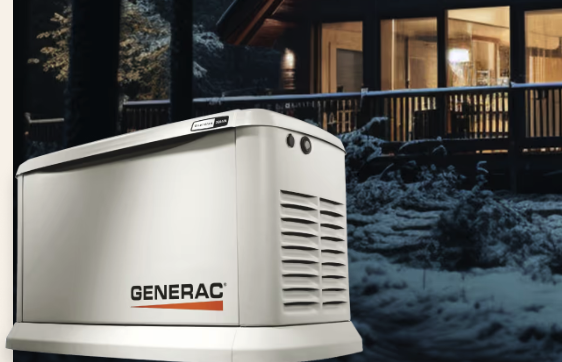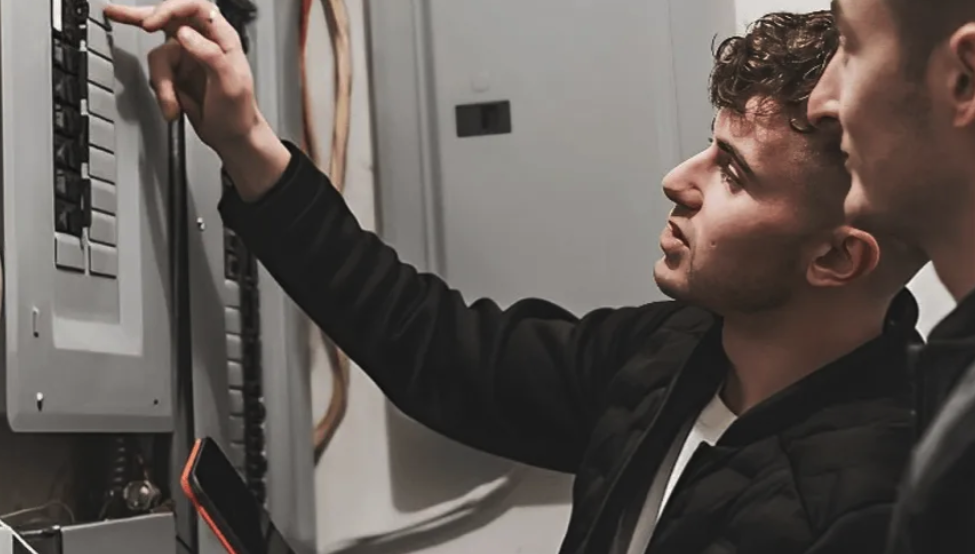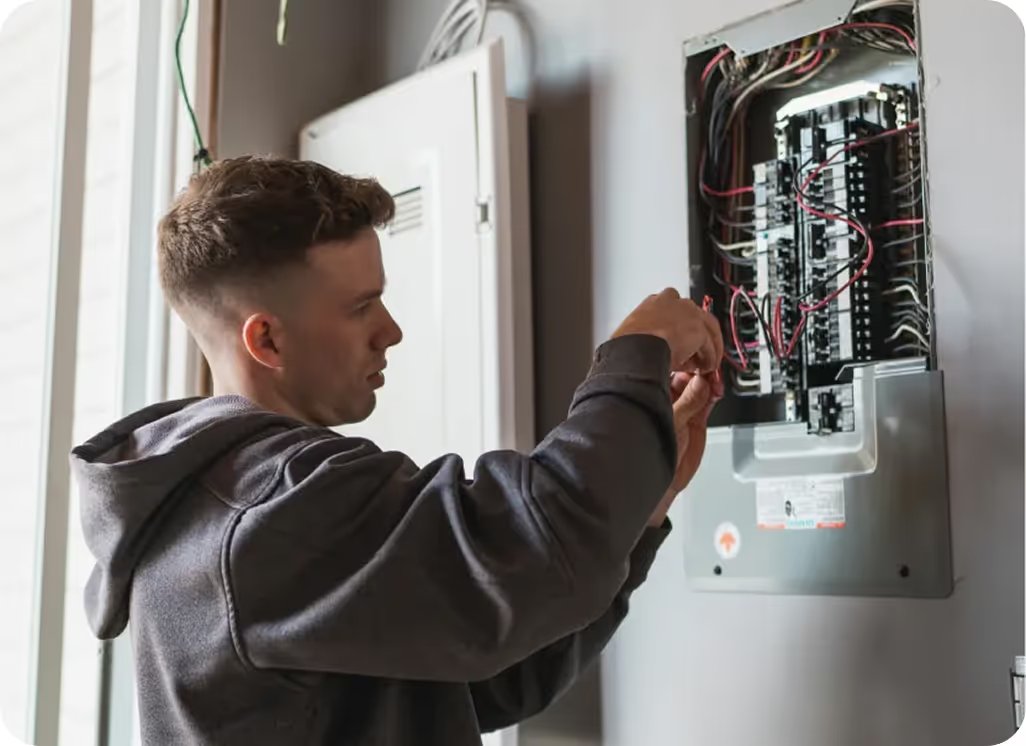Buy an automatic generator and extended warranty at no cost.
Get the 10-year warranty instead of the 5-year warranty ($2,000 value).
Some conditions apply*

The choice between batteries and generators depends on your specific needs. Battery systems offer instant start, quiet operation, and require less maintenance, but with limited battery life (generally 8-12 hours for a typical home). Generators provide extended battery life as long as there is fuel, support significant loads, but require regular maintenance and generate noise. For optimal protection, several owners opt for a hybrid system combining the two technologies.
Electrical failures can disrupt your daily life and damage your electronic devices. According to Hydro-Québec, service interruptions may occur during winter storms or extreme weather conditions, leaving your home without electricity for several hours or even days.
Residential battery systems, such as the Tesla Powerwall or similar solutions, store electrical energy to be restored instantly during a failure. These technologies primarily use lithium-ion batteries to power your essential devices.
Instant start: Batteries provide immediate power, with no transition delay, protecting your sensitive electronic devices like computers and security systems.
Silent operation: Unlike generators, batteries emit no noise, maintaining the tranquility of your neighborhood and complying with municipal regulations.
No emissions: Battery systems do not produce polluting emissions and can be installed indoors without special ventilation, ideal for homes with limited space.
Minimal maintenance: Modern batteries require very little maintenance compared to generators that require regular checks, oil changes, and periodic tests.
Solar integration: Batteries can be coupled to solar panels to recharge during the day, considerably extending battery life during prolonged outages.
Limited autonomy: Most residential battery systems offer between 8 and 12 hours of battery life, depending on load and installed capacity. For essential equipment only, this can take up to 24 hours.
High initial cost: Lithium-ion battery systems represent a significant initial investment, typically between $15,000 and $20,000 installation included.
Degradation over time: Batteries gradually lose their storage capacity and need to be replaced afterwards 10 to 15 years depending on the use.
Limited load capacity: Energy-intensive appliances like central air conditioners, electric water heaters, or electric stoves can quickly drain the battery.

Generators convert mechanical energy into electricity by burning fuel (diesel, propane, or natural gas). They are a mature and reliable solution for residential emergency power.
Extended battery life: As long as there is fuel available, a generator can run indefinitely, which is essential during prolonged winter outages in Quebec.
High capacity: Generators can handle heavy loads and power your entire home, including heating, air conditioning, and all of your household appliances simultaneously.
Lower cost per kW: For larger capacities, generators generally offer a lower cost per kilowatt Only the batteries
Proven technology: Generators benefit from decades of development and are particularly adapted to the harsh Quebec climate.
Start-up delay: Generators generally require 10 to 30 seconds to start and stabilize the voltage, creating a temporary interruption that can affect sensitive devices.
Noise and vibration: The operation of a generator generates a significant noise level of 60-80 decibels sometimes requiring soundproofing measures and compliance with municipal regulations.
Regular maintenance: Generators require periodic maintenance including oil changes, filters, mechanical inspections, and monthly tests to ensure their reliability.
Emissions and fuel: They produce exhaust gases and require a fuel supply as well as a standards-compliant exhaust system.
Outdoor installation: Generators must be installed outside with minimum distances in accordance with municipal regulations and Quebec building code.

Identify your critical loads: refrigerator, freezer, sump pump, heating system, essential lighting. A typical Quebec home consumes about 30-40 kWh per day. Determine which devices are absolutely necessary during an outage.
If your area has mostly short outages (less than 12 hours), a battery system may suffice. For prolonged outages, especially during Quebec winter storms that can last several days, a generator becomes essential.
Available space, municipal noise regulations and minimum distances strongly influence the choice. Batteries are better suited to small urban lots, while generators require appropriate outdoor space.
Batteries: Initial cost of $15,000 - 20,000, minimal maintenance, replacement after 10-15 years (approximately 60% of the initial cost).
Generators: Initial cost of $6,000 - 15,000, more expensive annual maintenance, fuel during breakdowns, lifespan of 20-30 years with proper maintenance.
More and more Quebec owners are adopting a hybrid approach that combines batteries and generators:
This configuration is particularly relevant for residences with essential medical equipment or home offices where continuity is critical.

The installation of generators and battery systems must comply with current electrical standards. Outdoor generators are subject to municipal regulations regarding noise, minimum distances from neighboring properties, and emissions. For the residential electrical systems, it is essential to use qualified contractors who have the appropriate licenses from the Régie du Bâtiment du Québec (RBQ).
Choosing between batteries and generators is an important decision for your safety and comfort. Each solution has distinct advantages depending on your specific needs, your budget and your installation constraints.
Do you need help to determine the best energy autonomy solution for your home? ERCO experts have the necessary experience to analyze your needs and design an emergency power system adapted to your Quebec reality. Whether you opt for batteries, a generator or a hybrid solution, we support you from design to installation.
Contact our specialists today for a personalized assessment of your energy autonomy needs. Protect your family and your assets with a reliable solution that complies with Quebec standards.

Generac automatic generators combine innovation and reliability to protect your home, season after season.

Capture every ray to light up your home. Our solar panels transform light into clean and sustainable energy, for a home that is always powered.

Peace of mind starts here: an electrical panel that's built to last, designed for you.
.avif)
Make sure you always have the spark you need. Elios Litio10.2 wall batteries store excess solar energy so that you remain autonomous.